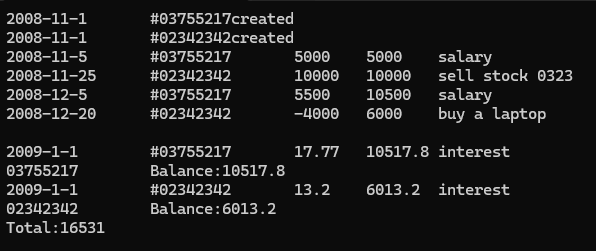实验3
#pragma once #include <iostream> #include <string> using std::string; using std::cout; // 按钮类 class Button { public: Button(const string &text); string get_label() const; void click(); private: string label; }; Button::Button(const string &text): label{text} { } inline string Button::get_label() const { return label; } void Button::click() { cout << "Button '" << label << "' clicked\n"; } #pragma once #include "button.hpp" #include <vector> #include <iostream> using std::vector; using std::cout; using std::endl; // 窗口类 class Window{ public: Window(const string &win_title); void display() const; void close(); void add_button(const string &label); private: string title; vector<Button> buttons; }; Window::Window(const string &win_title): title{win_title} { buttons.push_back(Button("close")); } inline void Window::display() const { string s(40, '*'); cout << s << endl; cout << "window title: " << title << endl; cout << "It has " << buttons.size() << " buttons: " << endl; for(const auto &i: buttons) cout << i.get_label() << " button" << endl; cout << s << endl; } void Window::close() { cout << "close window '" << title << "'" << endl; buttons.at(0).click(); } void Window::add_button(const string &label) { buttons.push_back(Button(label)); } #include "window.hpp" #include <iostream> using std::cout; using std::cin; void test() { Window w1("new window"); w1.add_button("maximize"); w1.display(); w1.close(); } int main() { cout << "用组合类模拟简单GUI:\n"; test(); }
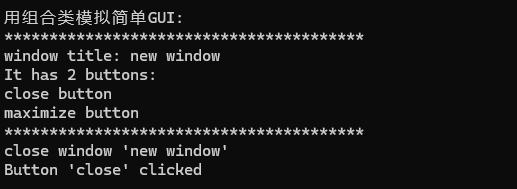
实验2
#include <iostream> #include <vector> using namespace std; void output1(const vector<int> &v) { for(auto &i: v) cout << i << ", "; cout << "\b\b \n"; } void output2(const vector<vector<int>> v) { for(auto &i: v) { for(auto &j: i) cout << j << ", "; cout << "\b\b \n"; } } void test1() { vector<int> v1(5, 42); const vector<int> v2(v1); v1.at(0) = -999; cout << "v1: "; output1(v1); cout << "v2: "; output1(v2); cout << "v1.at(0) = " << v1.at(0) << endl; cout << "v2.at(0) = " << v2.at(0) << endl; } void test2() { vector<vector<int>> v1{{1, 2, 3}, {4, 5, 6, 7}}; const vector<vector<int>> v2(v1); v1.at(0).push_back(-999); cout << "v1: \n"; output2(v1); cout << "v2: \n"; output2(v2); vector<int> t1 = v1.at(0); cout << t1.at(t1.size()-1) << endl; const vector<int> t2 = v2.at(0); cout << t2.at(t2.size()-1) << endl; } int main() { cout << "测试1:\n"; test1(); cout << "\n测试2:\n"; test2(); }
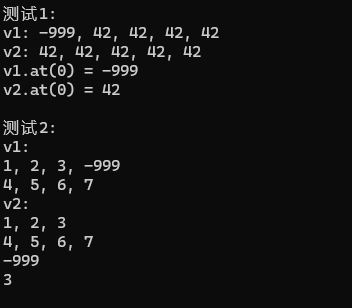
实验3
#pragma once #include <iostream> #include <cassert> using std::cout; using std::endl; // 动态int数组对象类 class vectorInt{ public: vectorInt(int n); vectorInt(int n, int value); vectorInt(const vectorInt &vi); ~vectorInt(); int& at(int index); const int& at(int index) const; vectorInt& assign(const vectorInt &v); int get_size() const; private: int size; int *ptr; // ptr指向包含size个int的数组 }; vectorInt::vectorInt(int n): size{n}, ptr{new int[size]} { } vectorInt::vectorInt(int n, int value): size{n}, ptr{new int[size]} { for(auto i = 0; i < size; ++i) ptr[i] = value; } vectorInt::vectorInt(const vectorInt &vi): size{vi.size}, ptr{new int[size]} { for(auto i = 0; i < size; ++i) ptr[i] = vi.ptr[i]; } vectorInt::~vectorInt() { delete [] ptr; } const int& vectorInt::at(int index) const { assert(index >= 0 && index < size); return ptr[index]; } int& vectorInt::at(int index) { assert(index >= 0 && index < size); return ptr[index]; } vectorInt& vectorInt::assign(const vectorInt &v) { delete[] ptr; // 释放对象中ptr原来指向的资源 size = v.size; ptr = new int[size]; for(int i = 0; i < size; ++i) ptr[i] = v.ptr[i]; return *this; } int vectorInt::get_size() const { return size; } #include "vectorInt.hpp" #include <iostream> using std::cin; using std::cout; void output(const vectorInt &vi) { for(auto i = 0; i < vi.get_size(); ++i) cout << vi.at(i) << ", "; cout << "\b\b \n"; } void test1() { int n; cout << "Enter n: "; cin >> n; vectorInt x1(n); for(auto i = 0; i < n; ++i) x1.at(i) = i*i; cout << "x1: "; output(x1); vectorInt x2(n, 42); vectorInt x3(x2); x2.at(0) = -999; cout << "x2: "; output(x2); cout << "x3: "; output(x3); } void test2() { const vectorInt x(5, 42); vectorInt y(10, 0); cout << "y: "; output(y); y.assign(x); cout << "y: "; output(y); cout << "x.at(0) = " << x.at(0) << endl; cout << "y.at(0) = " << y.at(0) << endl; } int main() { cout << "测试1: \n"; test1(); cout << "\n测试2: \n"; test2(); }
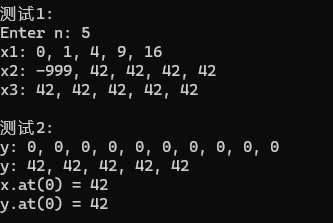
实验4
#pragma once #include <iostream> #include <cassert> #define value 0 using namespace std; // 类Matrix的声明 class Matrix { public: Matrix(int n, int m); // 构造函数,构造一个n*m的矩阵, 初始值为value Matrix(int n); // 构造函数,构造一个n*n的矩阵, 初始值为value Matrix(const Matrix &x); // 复制构造函数, 使用已有的矩阵X构造 ~Matrix(); void set(const double *pvalue); // 用pvalue指向的连续内存块数据按行为矩阵赋值 void clear(); // 把矩阵对象的值置0 const double& at(int i, int j) const; // 返回矩阵对象索引(i,j)的元素const引用 double& at(int i, int j); // 返回矩阵对象索引(i,j)的元素引用 int get_lines() const; // 返回矩阵对象行数 int get_cols() const; // 返回矩阵对象列数 void display() const; // 按行显示矩阵对象元素值 private: int lines; // 矩阵对象内元素行数 int cols; // 矩阵对象内元素列数 double *ptr; }; Matrix::Matrix(int n,int m) { lines=n; cols=m; ptr=new double[lines*cols]; for (int i =0;i<n;++i) for (int j=0;j<m;++j) ptr[i*lines+j]=value; } Matrix::Matrix(int n) { lines=n; cols=n; ptr=new double[lines*cols]; for (int i =0;i<n;++i) for (int j=0;j<n;++j) ptr[i*lines+j]=value; } Matrix::Matrix(const Matrix &x){ lines=x.lines; cols=x.cols; ptr=new double[lines*cols]; for (int i =0;i<x.lines;++i) for (int j=0;j<x.cols;++j) { ptr[i*lines+j]=x.ptr[i*lines+j]; } } Matrix::~Matrix() { delete [] ptr; } void Matrix::set(const double *pvalue) { for(int i=0;i<lines*cols;++i) ptr[i]=*pvalue++; } void Matrix::clear() { for(int i=0;i<lines;++i) for(int j=0;j<cols;++j) { ptr[i*lines+j]=value; } } const double& Matrix::at(int i, int j) const { return ptr[i*lines+j]; } double& Matrix::at(int i, int j) { return ptr[i*lines+j]; } int Matrix::get_lines() const { return lines; } int Matrix::get_cols() const { return cols; } void Matrix::display() const { for(int i=0;i<lines*cols;++i) { if ((i+1)%cols!=0) cout<<ptr[i]<<' '; else cout<<ptr[i]<<"\n"; } }
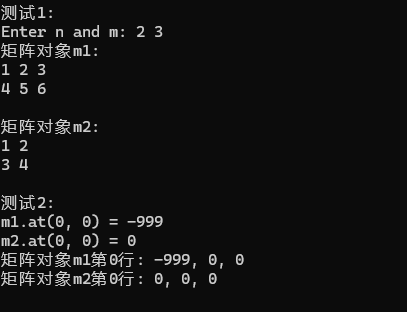
实验5
#pragma once #include <iostream> #include <string> using namespace std; class User{ public: User(string text); User(string text1,string text2,string text3); void set_email(); void change_password(); void display(); private: string name; string password; string email; }; User::User(string text) { name=text; password="123456"; email=""; } User::User(string text1,string text2,string text3) { name=text1; password=text2; email=text3; } void User::set_email() { cout<<"Enter email address: "; string text;cin>>text; while(text.find('@')==std::string::npos) { cout<<"illegal email. Please re_enter email: "; cin>>text; } cout<<"email is set successfully..."<<endl; email=text; } void User::change_password() { cout<<"Enter old password:"; string pre_password;cin>>pre_password; int cnt=1; for (int i=0;i<2;++i) { if (pre_password!=password) { cout<<"password input error. Please re_enter angain: "; cin>>pre_password; cnt++; } else break; } if (cnt==3) { cout<<"password input error. Please try after a while."<<endl; return ; } cout<<"Enter new password: "; string new_password;cin>>new_password; password=new_password; cout<<"new pssword is set successfully..."<<endl; } void User::display() { cout<<"name: "<<name<<endl; string s(password.length(), '*'); cout<<"pass: "<<s<<endl; cout<<"email: "<<email<<endl; } #include "user.hpp" #include <iostream> #include <vector> #include <string> using std::cin; using std::cout; using std::endl; using std::vector; using std::string; void test() { vector<User> user_lst; User u1("Alice", "2024113", "Alice@hotmail.com"); user_lst.push_back(u1); cout << endl; User u2("Bob"); u2.set_email(); u2.change_password(); user_lst.push_back(u2); cout << endl; User u3("Hellen"); u3.set_email(); u3.change_password(); user_lst.push_back(u3); cout << endl; cout << "There are " << user_lst.size() << " users. they are: " << endl; for(auto &i: user_lst) { i.display(); cout << endl; } } int main() { test(); }

实验6
#ifndef __DATE_H__ #define __DATE_H__ class Date{ private: int day; int month; int year; int totalDays; public: Date(int year,int month,int day); int getDay()const {return day;} int getMonth()const {return month;} int getYear()const {return year;} int getMaxDay() const; bool isLeapYear() const { return year%4==0&&year%100!=0||year%400==0; } void show() const; int Distance(const Date& date) const{ return totalDays-date.totalDays; } }; #endif #include "date.h" #include <iostream> #include <cstdlib> using namespace std; namespace{ const int DAYS_BEFORE_MONTH[]={0,31,59,90,120,151,181,212,243,273,304,334,365}; } Date::Date(int year,int month,int day):year(year),month(month),day(day) { if (day<=0||day>getMaxDay()) { cout<<"Invalid date"<<endl; show(); cout<<endl; exit(-1); } int years=year-1; totalDays=years*365+years/4-year/100+year/400+DAYS_BEFORE_MONTH[month-1]+day; if (isLeapYear()&&month>2)totalDays++; } int Date::getMaxDay() const { if (isLeapYear()&&month==2) { return 2; } else { return DAYS_BEFORE_MONTH[month]-DAYS_BEFORE_MONTH[month-1]; } } void Date::show() const { cout<<getYear()<<"-"<<getMonth()<<"-"<<getDay(); } #ifndef __ACCOUNT_H__ #define __ACCOUNT_H__ #include "date.h" #include <string> class SavingsAccount{ private: std::string id; double balance; double rate; Date lastDate; double accumulation; static double total; void record(const Date &date,double amount,const std::string &desc); void error(const std::string &msg) const; double accumulate(const Date &date) const { return accumulation+balance*date.Distance(lastDate); } public: SavingsAccount(const Date &date,const std::string &id,double rate); const std::string &getId() const {return id;} double getBalance() const {return balance;} double getRate() const {return rate;} static double getTotal() {return total;} void deposit (const Date &date,double amount,const std::string &desc); void withdraw (const Date &date,double amount,const std::string &desc); void settle (const Date &date); void show() const; }; #endif #include "account.h" #include <cmath> #include <iostream> using namespace std; double SavingsAccount::total=0; SavingsAccount::SavingsAccount(const Date &date,const std::string &id,double rate) :id(id),balance(0),rate(rate),lastDate(date),accumulation(0) { date.show(); cout<<"\t#"<<id<<"created"<<endl; } void SavingsAccount::record(const Date &date,double amount,const std::string &desc) { accumulation=accumulate(date); lastDate=date; amount=floor(amount*100+0.5)/100; balance+=amount; total+=amount; date.show(); cout<<"\t#"<<id<<"\t"<<amount<<"\t"<<balance<<"\t"<<desc<<endl; } void SavingsAccount::error(const string &msg) const { cout<<"Error(#"<<id<<")"<<msg<<endl; } void SavingsAccount::deposit(const Date &date,double amount,const string &desc) { record(date,amount,desc); } void SavingsAccount::withdraw(const Date &date,double amount,const string &desc) { if (amount>getBalance()) { error("not enough money"); } else { record(date,-amount,desc); } } void SavingsAccount::settle(const Date &date) { double interest=accumulate(date)*rate/date.Distance(Date(date.getYear()-1,1,1)); if (interest!=0) { record(date,interest,"interest"); accumulation=0; } } void SavingsAccount::show() const { cout<<id<<"\tBalance:"<<balance; } #include "account.h" #include <iostream> using namespace std; int main() { Date date(2008,11,1); SavingsAccount accounts[]= { SavingsAccount(date,"03755217",0.015), SavingsAccount(date,"02342342",0.015) }; const int n=sizeof(accounts)/sizeof(SavingsAccount); accounts[0].deposit(Date(2008,11,5),5000,"salary"); accounts[1].deposit(Date(2008,11,25),10000,"sell stock 0323"); accounts[0].deposit(Date(2008,12,5),5500,"salary"); accounts[1].withdraw(Date(2008,12,20),4000,"buy a laptop"); cout<<endl; for (int i=0;i<n;i++) { accounts[i].settle(Date(2009,1,1)); accounts[i].show(); cout<<endl; } cout<<"Total:"<<SavingsAccount::getTotal()<<endl; return 0; }
